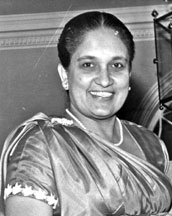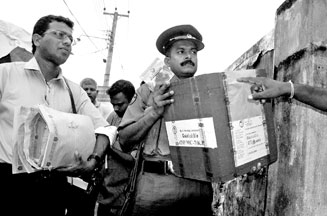More women in politics, please

 |
|
Mrs. Sirimavo
Bandaranaike |
Not many have commented on one glaring fact associated with the list
of candidates for the January 26 Presidential Election: There is not
even one woman in the list. This fact may have escaped the scrutiny of
political observers due to the hustle and bustle of the electioneering
process, but it is obvious to anyone who peruses the list of candidates.
What keeps women away from politics? This is the question that we
have to answer. But before we go any further, it is worth remembering
that Sri Lanka produced the world's first woman Prime Minister, Sirimavo
Bandaranaike, in 1960. Her daughter Chandrika Bandaranaike Kumaratunga
was the country's first woman Executive President.
The irony is that a nation which had a female Prime Minister and a
female President has only a very limited number of women actively
engaged in politics. There are only a few at ministerial and MP level.
The story is the same at provincial council and local body level. This
is indeed a pathetic situation for a country that cherishes democracy
and holds a myriad of national and regional elections every few years.
Where have we gone wrong in this regard? It is worth probing.
Sri Lanka has a very high literacy rate. Unlike in some other South
Asian countries, Sri Lankan families do not neglect their girl children.
When it comes to education, children from both sexes get an equal chance
all the way up to university level. Thus there is generally a high
political awareness and maturity among the women population. Women are
passionately involved in political discussions at home, workplaces and
in the print and electronic media. In fact, one needs to go early in the
morning to a polling booth on an election day to gauge the truth. Women
voters are generally keener and vote in greater numbers than men. They
form the longer queue at polling booths.
Thus the reality is that women are politically savvy in this country.
So what is preventing many of them from taking the step - entering
politics? The first hindrance seems to that it is hard to break into
politics in the first place.
Even most men, leave alone women, cannot take this first step if they
do not have the proper 'connections' in political parties. In the
majority of cases, women who take to politics are from so-called
'political' families. Mrs. Sirimavo Bandaranaike entered politics
following the assassination of her husband, Prime Minister S.W.R.D.
Bandaranaike in 1959. It was thus somewhat easier for her daughter (and
son) to enter politics.
If one analyses the composition of the present Parliament, it is
clear that almost all of the women MPs hail from political families.
They have taken to politics with the blessings of, or following the
demise of, their fathers, mothers, brothers or uncles. Only one or two
have entered the world of politics on their own.
Therefore, it is up to political parties to change this status quo.
One cannot banish political family entrants, for it is better to have at
least a few through that route instead of having none at all. But
political parties must strive to identify women professionals and others
at grassroots level who would, if given an opportunity, like to enter
politics. They should be given nominations for the lowest rung - local
bodies.
There is already a constitutional requirement that 35 percent of the
nominations for local bodies should be for youth aged 35 or less. This
could perhaps be amended to reflect a definite male:female ratio - may
be 20 percent women. Then political parties will have no alternative
other than nominating a certain number of women, depending on the size
of the given local body or bodies. This step will enable more women to
have a greater say in local affairs - development, social welfare,
poverty alleviation etc.
This rule should be extended to provincial council and national
elections. There would be new entrants, but there would be a bigger
chance for women who have already taken the plunge through local bodies.
They can go up the ladder gradually as they accumulate more experience
serving the masses countrywide. There is a perception that women
politicians could be more honest, which will also help their progress.
The very nature of the Proportional Representation System is that it
leads to intense rivalry among the candidates of the same political
party as votes are counted on a district basis. This gives rise to
intense competition among the candidates. This usually leads to
violence.
This is another factor that keeps women away from politics. Sri
Lankan elections are usually violent affairs, replete with deaths, acts
of intimidation, clashes, acts of arson and assaults. Not many
professionals and intellectuals want to enter the fray in such a
background. Women candidates can hardly survive politically in such an
environment. More women will certainly enter the fray if violence can be
eliminated or at least reduced during election periods.
 |
|
Ballot boxes being
taken to counting centres. |
The massive cost of electioneering is another obstacle for women from
ordinary families who wish to enter politics. Under the PR System, MPs
have to garner votes from an entire district, not only from one
electorate. Thus one has to campaign and distribute publicity material
in the entire district spending a considerable sum of money. Only a few
can afford to do so on their own without depending on donations from
persons with vested interests. Hopefully the electoral reforms process
will address this issue as well. There should also be more opportunities
to campaign through the electronic media.
It is also wrong to confine women politicians to the subjects of
women's affairs and children's welfare, which is mostly the case in this
country. The more experienced women provincial councillors and ministers
should be given other subjects such as agriculture, lands, education,
health etc. This will enable them to break out of the stereotypes and
serve the nation in a better way.
Our lawmakers could also study the political systems of countries
such as Australia and New Zealand which have a considerable number of
women holding very important positions in government, as to how they
have reached that status. All such mechanisms may not be suitable for
our country, but there could be valuable lessons.
The bottom line is that we need more women in politics. More women
will mean a brighter, more colourful and vibrant political arena. Women
will also be able to make a bigger contribution to society and to the
country if more of them take to politics. The Government, political
parties and civil society should pave the way for that.
|

